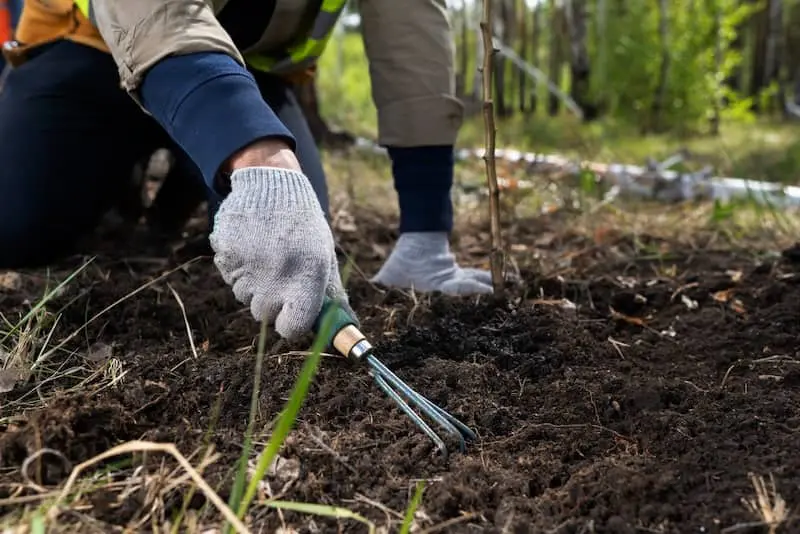Soil health is the foundation of a thriving garden. Without nutrient-rich, well-balanced soil, even the most meticulously maintained landscape can struggle to reach its full potential. Gardeners and landscaping professionals alike recognize that professional softscape services have to incorporate soil improvement strategies. Soil health is critical if you want to keep your lawn and garden in its prime for years to come. Understanding the relationship between soil health and garden maintenance can significantly impact plant growth, pest resistance, and sustainability.
For homeowners and businesses investing in complete softscape maintenance services, prioritizing soil health should be a top concern. This blog explores how soil health affects garden maintenance, common soil issues, and the best strategies to enhance it.
The Role of Soil Health in Garden Maintenance
Soil is much more than just a medium for plants to grow. It serves as a living ecosystem filled with microorganisms, nutrients, and organic matter that support plant development. Healthy soil regulates moisture levels, provides essential minerals, and helps plants resist disease. In contrast, poor soil quality leads to nutrient deficiencies, water retention problems, and an overall decline in garden aesthetics.
When homeowners or businesses invest in professional softscape services, they’re not just hiring experts to plant flowers or trim hedges—they’re ensuring they nurture the foundation of their landscape for long-term success. A landscape rich in organic matter, beneficial microbes, and well-balanced pH levels will sustain plant health and reduce maintenance efforts over time.
How Poor Soil Affects Garden Maintenance
Many gardeners and property owners face challenges that stem directly from poor soil health. Some of the most common soil-related issues include:
- Nutrient Deficiency: Plants struggle to grow without essential nutrients like nitrogen, phosphorus, and potassium. A lack of these minerals can lead to weak growth, yellowing leaves, and stunted development.
- Compacted Soil: When soil becomes too dense, it prevents air and water from circulating properly. Roots struggle to spread, and plant health declines.
- Excessive Water Retention or Drainage Problems: Poor soil structure can either retain too much water, leading to root rot, or drain too quickly, dehydrating plants.
- pH Imbalance: Soil that is too acidic or too alkaline disrupts nutrient absorption, preventing plants from getting the minerals they need.
An experienced softscape designer recognizes these issues and tailors solutions to improve soil conditions before implementing planting or maintenance strategies.
How Complete Softscape Maintenance Services Support Soil Health
Softscaping goes beyond visual appeal—it plays a crucial role in soil enrichment and overall garden sustainability. Complete softscape services involve a combination of soil improvement techniques, plant selection, and routine care that enhance soil fertility over time.
Organic Matter and Mulching
One of the most effective ways to enhance soil health is by adding organic matter such as compost, mulch, and decomposed leaves. These materials help soil retain moisture, regulate temperature, and improve microbial activity. Mulching, in particular, is an essential part of professional softscape services. Mulching reduces evaporation to maintain soil moisture. It suppresses weed growth, which reduces competition for nutrients. Mulching also enhances the soil structure and increases aeration, which makes for healthier roots and happier plants.
By integrating organic matter into soil care routines, landscapers ensure that plants receive steady nourishment, leading to lush, thriving gardens.
The Impact of Soil Health on Plant Selection and Growth
Healthy soil influences plant growth in multiple ways. A professional softscape services provider carefully assesses soil conditions before recommending plants that will thrive in the environment. Factors such as drainage capacity, nutrient availability, and microbial activity all determine which plant species will perform best.
For example, sandy soil drains quickly and may require frequent fertilization, whereas clay soil retains moisture but often lacks aeration. A complete softscape maintenance services provider chooses plants and adapts gardening techniques to accommodate these differences, ensuring the landscape remains vibrant and resilient throughout the seasons.
How Plants Contribute to Soil Health
Interestingly, plants also play a role in improving soil conditions. Deep-rooted plants like ornamental grasses help break up compacted soil, allowing better water infiltration. Cover crops and nitrogen-fixing plants replenish essential nutrients, reducing the need for chemical fertilizers. By carefully selecting a mix of plants that complement the existing soil, an experienced softscape designer can create a sustainable, self-supporting landscape.
Soil Enrichment Strategies for Long-Term Garden Maintenance
Landscapers and gardeners implement several long-term strategies to maintain healthy soil. When considering local softscape and hardscape companies, look for a company that employs the following strategies to ensure the lasting health of your lawn and garden.
Regular Soil Testing
Soil testing provides valuable insights into nutrient levels, pH balance, and organic matter content. Regular testing allows landscapers to make informed decisions about soil amendments and fertilization schedules. Professional softscape services often include soil analysis as part of their comprehensive maintenance plans to ensure plants receive optimal care.
Aeration and Soil Conditioning
Compacted soil restricts root expansion and reduces water penetration. Aeration techniques, such as core aeration or deep tilling, help loosen soil and improve its structure. This enhances plant root development and boosts nutrient uptake.
Sustainable Fertilization Methods
Chemical fertilizers may provide quick results, but can deplete soil health over time. Organic fertilizers, compost tea, and slow-release nutrients help sustain soil fertility without disrupting microbial balance. Many complete softscape maintenance service providers prioritize eco-friendly fertilization methods to promote long-term sustainability.
Invest in Your Garden’s Foundation
Soil health and garden maintenance go hand in hand. Even the most beautifully designed softscapes will struggle to thrive without a strong foundation. Investing in professional softscape services ensures that a professional carefully manages soil conditions to support vibrant, resilient plant life.
Whether you’re a homeowner looking to maintain a stunning backyard or a business seeking complete softscape maintenance services for commercial properties, understanding the vital role of soil health will help you make informed landscaping decisions. With the expertise of an experienced softscape designer, your garden can remain lush, healthy, and sustainable for years to come.

